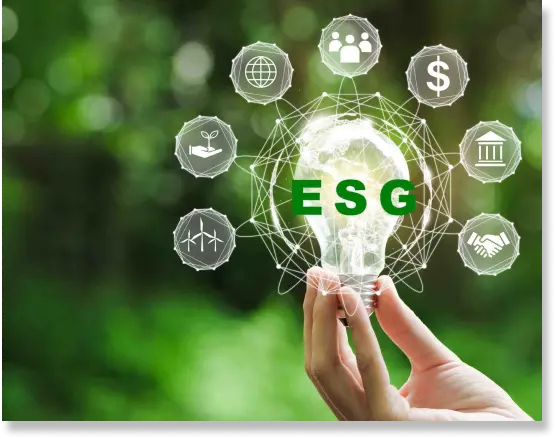Case Study | 29 July 2025
Integrating ESG in Advanced Materials Manufacturing: How an Indian Nanomaterial Manufacturer Reinvented Its Growth Trajectory
Posted by : Preeti Wani
In today’s rapidly changing industrial landscape, sustainability is no longer optional; it is essential. For companies in advanced materials manufacturing, including Environmental, Social, and Governance (ESG) principles, has become a primary differentiator in global markets. An Indian nanomaterials manufacturer recognized this necessity in 2022 as it aimed to increase its global presence. Despite its strong technological capabilities, the company faced growing pressure from investors and international clients to demonstrate transparency, environmental responsibility, and social impact. In response, the company partnered with Research Nester to implement ESG considerations into its operations, marking the beginning of a transformative journey toward responsible growth and market leadership.

An overview:
In 2022, a mid-sized Indian enterprise specializing in advanced nanomaterials for high-performance sectors found itself at a defining juncture in its growth journey. Renowned for its cutting-edge nanocomposites and coatings used across aerospace, electronics, and renewable energy industries, the company aspired to upgrade its global presence. However, its rapid technological advancement was not matched by a cohesive ESG strategy, creating friction as international clients and investors increasingly emphasized transparency, sustainability, and social responsibility. To navigate this challenge, the company engaged with Research Nester to include ESG principles in its core manufacturing processes while expanding its market applications and reinforcing long-term business resilience.


The Story
The company laid out a clear vision: reduce its environmental footprint, support its workforce and surrounding communities, and uphold strong corporate governance. But bringing this idea to reality was not as easy as it looked. Despite its strong dedication to ESG principles, the company faced considerable hurdles. Financial constraints limited investment in eco-friendly upgrades, as few investors showed interest in backing long-term sustainability efforts. Internally, employees expressed hesitation and uncertainty, concerned about how the new policies might affect their job roles and job security. Meanwhile, global supply chain disruptions rose costs and delayed raw material deliveries, putting pressure on operations. Still, the firm remained committed. These early struggles would soon become the base for a robust transformation, built on resilience, collaboration, and purpose-driven innovation.
Our Solution:
Research Nester conducted a three-tiered ESG assessment, each addressing critical gaps and opportunities across the company's value chain.
Environmental Analysis: Research Nester’s environmental audit revealed that the company’s traditional nanomaterial synthesis methods, while technically advanced, were energy-intensive and generated huge amounts of chemical waste.
Recommendations:
- Process Redesign with Green Chemistry: Replace solvent-based synthesis with water-based alternatives utilizing microwave-assisted techniques, lowering energy use by 28%.
- Circular Supply Integration: Source raw materials from nearby local industrial waste streams, such as fly ash and electronic scrap, to cut consumption of newly sourced raw materials and comply with the closed-loop economic principles.
- Carbon Emissions Assessments: Introduce IoT-based sensors to track emissions in real-time, helping the company to set exact decarbonization targets aligned with India’s Net Zero commitments.
Social Analysis: Research Nester then carried out an in-depth social impact assessment, including employee surveys, local community feedback, and customer satisfaction analysis.
Findings:
- 43% of employees reported limited access to upskilling programs.
- Labor disputes in Q2 2021 had delayed a key electronics client delivery.
- Community groups near the manufacturing facility raised concerns over untreated wastewater destroying agriculture.
Strategic Response:
- Employee Upskilling Programs: In partnership with technical institutes to introduce certification programs in nanotechnology safety, cleanroom operations, and lean manufacturing.
- Local Hiring and Inclusive Growth: Reserved 30% of new technician roles for local village youth, backed by vocational training and scholarships.
- Transparent Community Dialogue: Created a quarterly stakeholder forum where community representatives, local government officials, and company leadership co-created social development programs.
Governance Compliance Audit: Governance gaps were the most significant risk to investor confidence. Research Nester’s governance audit revealed fragmented data reporting, outdated board oversight, and no formal ESG disclosure framework.
Action Plan:
- Governance Reform: The board was reconstructed to include two independent directors and perform ESG performance audits quarterly.
- Digital Transparency Dashboard: Applied a blockchain-based reporting tool to assess ESG KPIs in real-time, accessible to clients and investors.
- Ethics and Compliance Charter: Launched a detailed ethics charter managing labor laws, corruption, gender equality, and vendor screening.


Results
Following a year of meticulous ESG integration, the company’s transformation was not just theoretical; it was reflected in the numbers:
|
Key Performance Indicator |
2021 (Before ESG Integration) |
2023 (Post ESG Adoption) |
|
Global Market Share |
3.6% |
9.3% |
|
Revenue from Sustainable Products |
₹73 Cr |
₹191 Cr |
|
Customer Satisfaction Index |
69% |
88% |
|
Employee Retention Rate |
60% |
85% |
|
ESG Investor Participation |
Nil |
3 institutional funds |
Given below are a few of the outcomes gained:
- Within a year, the company reduced its energy costs by 20%, while chemical waste generation dropped by 34%. These achievements helped them be eligible for green manufacturing grants from India’s Ministry of Science & Technology.
- Employee retention was improved by 26%, and community trust indicators measured via sentiment analysis tools rose by 41%. The company earned recognition in the India Inclusive Innovation Index 2023.
- The restructuring supported the company to earn an A rating in the India ESG Governance Index 2023. It also opened ways to new venture capital from global investors who previously rejected the company due to non-transparent practices.
customized message

Preeti Wani is a seasoned Manager – Research & Consulting at Research Nester, with over 10 years of diverse experience in the market research industry, including more than 3 years in a leadership role at the firm. Her expertise spans the Packaging (rigid, flexible, sustainable packaging, barrier technologies), Chemicals & Advanced Materials (specialty chemicals, polymers, coatings, adhesives, composites), and Metals, Minerals & Mining (ferrous/non-ferrous metals, rare earths, industrial minerals, mining technology) sectors.
At the core of her role, Preeti leads end-to-end research and consulting engagements, transforming complex client briefs into structured, insight-rich deliverables aligned with strategic business objectives. She brings a unique ability to balance deep analytical thinking with operational execution, managing cross-functional teams, streamlining research processes, and driving training programs to upskill teams and ensure methodological consistency.
Preeti is actively engaged in client communications, adept at capturing evolving requirements, resolving critical queries, and ensuring the on-time delivery of actionable, high-quality insights. Her consultative approach, combined with strong project management and clear communication, positions her as a trusted advisor for clients navigating fast-moving, innovation-intensive industries.
Recognized for her strategic foresight, leadership, and quality-driven mindset, Preeti continues to play a pivotal role in advancing both client outcomes and internal research excellence at Research Nester.
Thank you for contacting us!
We have received your request for proposal. Our research representative will contact you shortly.
Copyright @ 2026 Research Nester. All Rights Reserved.

